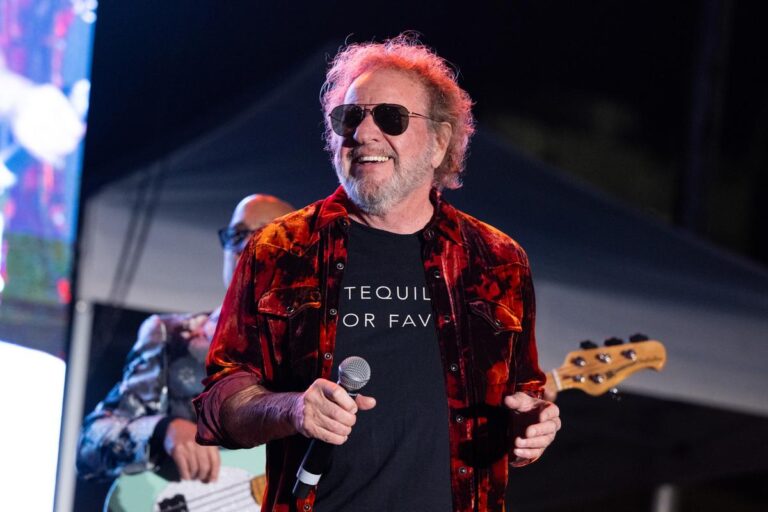If you dive into Latinaje — the new album by Argentine star Cazzu — motivated by morbid curiosity about the tabloid frenzy that has followed her during the past couple of years, you will probably be sorely disappointed.
True, the lyrics of many songs, including the Selena-flavored cumbia of lead single “Con Otra,” address in no uncertain terms the fallout of Cazzu’s relationship with Mexican singer Christian Nodal, the father of her daughter Inti.
But Latinaje is much more than just a breakup record. It is a sprawling, ambitious, and unifying celebration of Latin American music, anchored on genre roots and invested in exploring a wide array of styles with sympathetic ears. There’s smoldering salsa (“Que Disparen”), summery merengue (“Menú de Degustación”), a gutsy corrido tumbado about a red dress that became the stuff of legend in 2023 (“Dolce”), and a honey-sweet tribute to the Argentine folk format known as chacarera (“Me Tocó Perder.”)
At 31, Cazzu has been at the forefront of Argentina’s burgeoning trap scene since she contributed vocals to the 2018 smash “Loca,” sharing the spotlight with Khea, Duki, and Bad Bunny. Two years later, she burst into the global scene when her session with Argentine wunderkind Bizarrap went viral. She has always experimented with other genres, but the stylistic reach of Latinaje signifies a new beginning.From her Buenos Aires home, the artist, whose real name is Julieta Emilia Cazzuchelli, talked to Rolling Stone about her desire to leave the harshness of trap behind, the importance of staying true to her jujeña roots in the North of Argentina, and the upcoming release of her first book.
Listening to Latinaje, I got the recurring image of you opening a window to let the sunlight in. It also marks a complete reinvention of your musical persona. How did all this happen?
My own perception of myself is as somebody who is always looking for something new when it comes to her next project. I think my current age plays a factor on my artistic decisions. This quest was a bit introspective, as I wanted to deconstruct other people’s gaze on who I am — or who I’m supposed to be — and try to not be corralled by that archetype. As far as the recording of the album per se, I crafted it with less prejudice, and much less of an effort. I stopped worrying about constructing the Cazzu character who always responded in a combative way to any situation. My previous album, Nena Trampa followed that path. I almost felt that my responsibility as part of the urbano genre was to claim that space as someone who is permanently rough and explicit.
What’s fascinating about this album is that the lyrics are unquestionably seeped in sadness. But the overall vibe is luminous and joyful — almost celebratory.
I jumped into the recording process with a new mentality: Not everything that transpires in the studio needs to see the light of day. I’m going to work on these songs without thinking of the potential outcome. Maybe all those errors are the construction of a new path. The songs emerged from a less prejudiced place — this is why they’re so romantic. So many things transpired between my previous record and this one, that I finally found a way to talk about my roots and the place where I really belong.
It’s such a noble album. That’s the word that comes to mind.
It’s a beautiful word.
Your voice opens up on tracks like “Pobrecito Mi Patrón.” Is this the first record where you’re singing your heart out?
My musical path was always connected to marginalized genres: cumbia, trap, urbano. As far as the world at large is concerned, you’re not a musician — you’re a trapera; you’re not a singer— you’re a cumbiera. I grew up with those notions, and it was really cool, because you had zero responsibility. You could construct your artistic identity with total freedom. The truth is that I’ve been singing for a long time. There was a little ghost in me — the need to be aggressive and harsh — but I was ready to leave it behind. “La Cueva,” for instance, was a song that I recorded only for myself. But suddenly there’s someone next to you saying, “You’re really mean if you don’t share this track with the world.” [Producer] Nico Cotton was largely responsible for the purity that informs this album. He never stopped empowering me as a singer and composer.
The emotional crux of the album is “Inti,” a gorgeous song about your daughter. It’s like every other track leads to that one, emotionally charged moment…
Originally it was called “Un Ángel Me Miró” (“An Angel Looked At Me.”) But then Nico stepped in and said, no, it should be called “Inti.” It’s such an honest song, and it will feel uncomfortable to those who don’t understand what I’m talking about. It touches on the fear of something bad happening to your child. You’ll be driving home, and suddenly the most horrible intrusive thoughts cross your mind. I have this phrase that I use: basta, Julieta — just stop it. My therapist, who is also a mother, explained that this is perfectly normal. I thought it was important that a song about motherhood went beyond the idealization of everything that is perfect about the experience, and the immense love that you feel for your child.
As a lifelong salsa fan, I’ve had screaming matches with fellow Argentines who don’t appreciate Afro-Caribbean music. The fact that you included an authentic salsa jam makes me feel vindicated.
You know what the problem is? Buenos Aires. This is not an Argentina issue; it’s a Buenos Aires issue. I’m from Jujuy [laughs.] Where I’m from, you don’t know if you’re in Salta, Jujuy, or Bolivia. What kind of prejudice could I possibly harbor for music that has the kind of heritage that salsa does? This is why the concept of latinaje is so important to me. Here’s somebody from Jujuy singing a salsa tune. Tomorrow it could be someone from any other province. When I was growing up, at home we would listen to cumbias and huainos, but also Bryan Adams and [folk icon] Horacio Guarany. What kind of fictitious prejudice could I invent for myself in that context? I’m from the kind of place where the music stars are not born, and that’s the very DNA of Latinaje.
I’ve asked you about this before, and I’d like to touch on the Bizarrap session again. Your flow on that track is out of control. The little breaks, the rhythm changes; the way you toy with syllables and words. It’s filled with attitude and lush detail. How do you do that?
That song became the perfect vehicle to showcase those skills that I had cultivated for such a long time. This is the subject of Perreo, my first book, which is out in May. It focuses on the many disadvantages that a female in the urbano genre has to cope with. Part of the conversation that I have with myself and other artists in the book is asking those questions: why doesn’t anybody talk about my flow? Why did other aspects of my identity overshadow my talent for the palabreo, the complete alchemy that I energize with words? I spent most of my life listening to trap and reggaeton, until there came a moment when it was my turn to shine. The Bizarrap session was all about that. It was meant to be baroque, filled with micro details. It was designed that way.
I’m not going to ask about your personal life, but I am curious about one thing: Being an artist and stepping onstage in front of thousands of people is vulnerable enough. How do you manage to lead a normal life in the middle of such insidious media scrutiny?
It’s challenging. This moment in time is dominated by social media, where people have a difficult time separating the good from the bad. I try to focus on my development as a person, and my ideals as a feminist. I have the strong desire that women stop having to deal with so many situations that are imposed on them. And I use my favorite medium, music, as a way of lending a hand. I harbor a high level of respect for words — in my field, our whole universe is made up of words, and I treat them with the utmost respect.
I write a lot. I write my thoughts on paper, computer, or text messages. I confront my thoughts as a way of gaining a better understanding of myself. Am I a role model? In that case, what would a good role model be? Is it a combative person, or a pacifist? Is it Mother Teresa, or Simone de Beauvoir?
This bomb exploded in my life unexpectedly, and it surprised me that I could traverse it calmly. Being calm doesn’t mean that you’re not going to cry, or suffer, or experience major anxiety. That’s not what being calm is about. Being calm is refusing to enter into complete panic, and it has to do with honesty. When you’re honest and have nothing to hide, you will never be afraid of your life being scrutinized.



